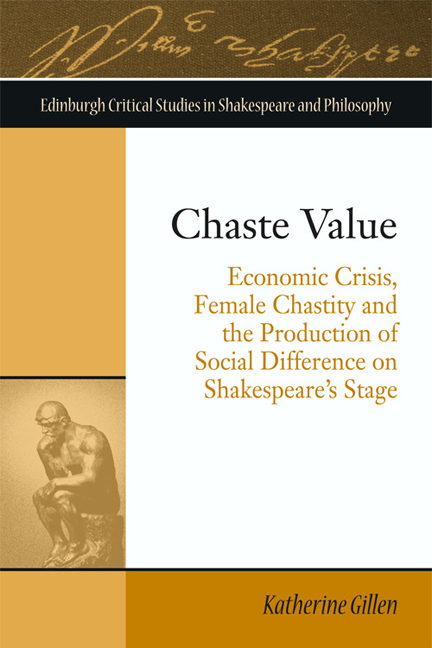 Chaste Value
Chaste Value Book contents
- Frontmatter
- Contents
- Acknowledgements
- Series Editor's Preface
- Introduction: Chastity and the Question of Value
- 1 Chastity and the Ethics of Commercial Theatre in Measure for Measure, Pericles and The Revenger's Tragedy
- 2 Commercial Chastity and Aristocratic Value in Troilus and Cressida, The White Devil and The Changeling
- 3 Chaste Selfhood: Ben Jonson's Critique of Urban Chastity Tropes
- 4 Chastity and Blackness: Racial Value and Commodity Potential in The Fair Maid of the West, Part I and Othello
- 5 Mediterranean Markets, Commoditised Masculinity and the Whitening of Christian Chastity in The Merchant of Venice and The Renegado
- 6 Chaste Treasure and National Identity in The Rape of Lucrece and Cymbeline
- Coda: Approaching Capitalist Modernity
- Index
3 - Chaste Selfhood: Ben Jonson's Critique of Urban Chastity Tropes
Published online by Cambridge University Press: 22 December 2017
- Frontmatter
- Contents
- Acknowledgements
- Series Editor's Preface
- Introduction: Chastity and the Question of Value
- 1 Chastity and the Ethics of Commercial Theatre in Measure for Measure, Pericles and The Revenger's Tragedy
- 2 Commercial Chastity and Aristocratic Value in Troilus and Cressida, The White Devil and The Changeling
- 3 Chaste Selfhood: Ben Jonson's Critique of Urban Chastity Tropes
- 4 Chastity and Blackness: Racial Value and Commodity Potential in The Fair Maid of the West, Part I and Othello
- 5 Mediterranean Markets, Commoditised Masculinity and the Whitening of Christian Chastity in The Merchant of Venice and The Renegado
- 6 Chaste Treasure and National Identity in The Rape of Lucrece and Cymbeline
- Coda: Approaching Capitalist Modernity
- Index
Summary
Ben Jonson's marriage masque Hymenaei (1606) features a competition between virginity, represented by Opinion, and married chastity, represented by Truth, in which marriage predictably triumphs. Jonson's seeming admiration for the virgin's autonomy complicates this generic trajectory, however. Although the ‘unprofitable virgin’ is maligned by Truth for her greedy hoarding, Opinion's depiction of virginity bears a close resemblance to Jonson's famed masculine ideal, what Thomas Greene calls the ‘centered self’. Like this masculine subject, Hymenaei's virgin possesses qualities associated with centeredness and circularity, both of which, in Jonson's corpus, ‘become symbols not only of harmony and completeness but of stability, repose, fixation, duration’. Virgins, Opinion extolls, ‘Have all things perfect, spin their own free fate, / Depend on no proud second, are their own / Center and circle, now and always one’ (718–20). The virgin thus serves as an analogue to Jonson's masculine ideal, in which the virtuous man is defined by his impenetrability. In Hymenaei, however, in which union signifies not only heterosexual marriage but also the yoking of Scotland to England and King James to his people, the virgin must submit to a higher power, compromising her autonomous integrity for ‘Eternal Unity’ (821), cemented ‘In th'one's obedience and the other's sway’ (730). Traditionally, the marriage contract, as Victoria Kahn demonstrates, functioned as a foundational analogy for the subject's relationship to the state. Here, the virgin's fate parallels that of the masculine subject in a monarchal society, sacrificing autonomy as she submits to potentially advantageous, though patriarchal, authority. This intermingling of erotic and political discourse, Melissa Sanchez points out, produces a subject who desires his own subjection and even abjection. Though ostensibly male, the subject is queered not only through this abjection but through repeated comparisons to the chaste – first virginal and then married – woman, figured in sexual relation to the male sovereign.
This chapter explores the permutations of this paradigm in London city comedy, where, I argue, chastity is invoked to explore the particular subjectivity of homo economicus. Throughout city comedy, female chastity functions as an analogue to masculine temperance and is invoked to explore men's subjugation to commercial forces. As Jean Howard demonstrates, prostitution plots often functioned as a means of negotiating the limits of traffic and its effect on the early modern subject.
- Type
- Chapter
- Information
- Chaste ValueEconomic Crisis, Female Chastity and the Production of Social Difference on Shakespeare's Stage, pp. 127 - 167Publisher: Edinburgh University PressPrint publication year: 2017


